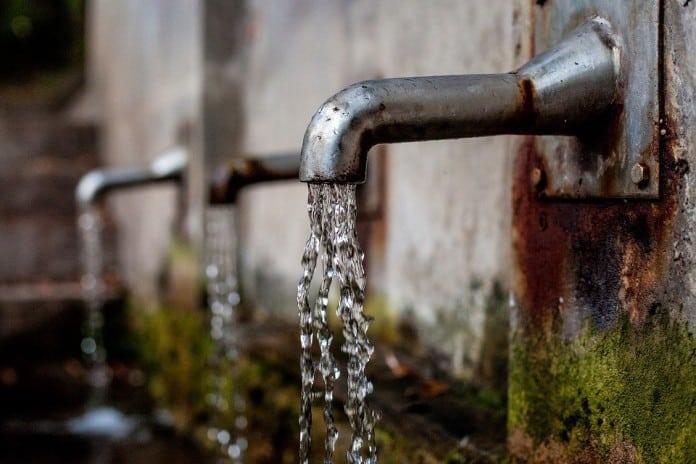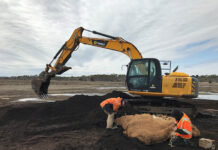
JOINT BASE – Two private wells in Manchester Township were found with unsafe levels of two known pollutants, and officials are urging people living near the border of the Joint Base McGuire-Dix-Lakehurst to return their water testing kits.
The Department of the Air Force sent out water testing kits to about 200 residences across multiple towns around the base with private wells late last year. Tech Sergeant Christopher Powell did not have specifics when he spoke with The Jackson Times, but said in a published interview with NJ.com on January 24 that out of the 200 kits distributed throughout Jackson and Manchester townships in Ocean County, and Pemberton and New Hanover townships in Burlington County, only 40 had been returned.
The Air Force only tested wells that surrounded the perimeter of the base. Powell said they will not be testing any wells outside that perimeter. Instead, residents were given their own kits.
 Jackson officials said JBMDL hand delivered about 50 water testing kits to residences on the southeastern side of town where the homes border the base. Powell could not say at press time how many samples delivered back were from Jackson residents.
Jackson officials said JBMDL hand delivered about 50 water testing kits to residences on the southeastern side of town where the homes border the base. Powell could not say at press time how many samples delivered back were from Jackson residents.
So far, two private wells in Manchester Township were found to be contaminated with unsafe levels of two known pollutants, Powell said. No private wells in Jackson have yet been found to contain unsafe levels of the chemicals.
Jackson Mayor Mike Reina said base officials are looking to hold a public information session at a date that is yet to be determined. The meeting will be held in Jackson, but will be open to people from all towns surrounding the base.
Testing began last summer, with validated results available in October.
“We have certain areas within those towns, mainly small areas bordering the base, we determined we wanted to sample in those areas,” Powell said. “We’ve already contacted those residents, delivered ground water sampling to them back in December, sent out another round of sampling packages to those who did not send in package.”
The owners of two private wells in Manchester where there were dangerous levels of the pollutants found are being supplied with as much drinking and cooking water as needed, for as long as needed, at the military’s cost. Powell told The Jackson Times that the homes would either be fit with water filtration systems or be connected to city water, again, at the military’s cost.
The water is safe for showering and doing laundry, he said.
The Environmental Protection Agency has issued health advisories for perfluoroctanesulfonic acid (PFOS) and perfluorooctanoic acid (PFOA), both of which were found in some groundwater and wells on JBMDL.
“PFOS and PFOA are a component of aqueous film forming foam (AFFF), a type of fire-fighting foam that has been used by industry and the Air Force since 1970 to extinguish petroleum fires. The Air Force used this foam at crash sites, in fire training areas and some maintenance hangars at active, reserve, Air National Guard and former bases,” a JBMDL press release explained. “Additionally, PFOS and PFOA are used in many industrial and consumer products such as nonstick cookware, stain-resistant fabric and carpet, some food packaging and specialized foam.”
PFOS is a key ingredient in Scotchgard and other stain repellants. According to a 2011 article in the American Journal of Epidemiology, PFOS was related to increases in chronic kidney disease.
PFOA is used in the process of making Teflon, which makes cooking surfaces nonstick and is also used a fabric protector.
 According to the American Cancer Society, although coated cookware is not a significant source of PFOA, the acid can stay in the body for long periods of time.
According to the American Cancer Society, although coated cookware is not a significant source of PFOA, the acid can stay in the body for long periods of time.
“PFOA has the potential to be a health concern because it can stay in the environment and in the human body for long periods of time. Studies have found that it is present worldwide at very low levels in just about everyone’s blood. Higher blood levels have been found in community residents where local water supplies have been contaminated by PFOA. People exposed to PFOA in the workplace can have levels many times higher,” the ACS said. “PFOA and some similar compounds can be found at low levels in some foods, drinking water, and in household dust. Although PFOA levels in drinking water are usually low, they can be higher in certain areas, such as near chemical plants that use PFOA.”
The base has since changed over to what it calls more “environmentally sound alternatives” to PFOS and PFOA.
Powell did not have a cost for remediating the soil and water on the base, or for the private wells affected.
Anyone with questions can contact Curt Frye, Chief JB MDL Environmental Restoration Program, at 609-754-4951 or Curtis.Frye@us.af.mil.






